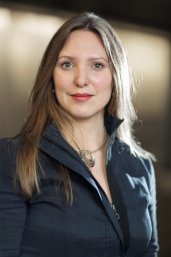Celia Berkers new chair professor of Metabolomics
The Executive Board has appointed Celia Berkers to the post of Professor of Metabolomics at the faculties of Veterinary Medicine and Science (Department of Chemistry), effective as of 1 February. She will mainly focus on studying metabolism in order to better understand the role that metabolic processes play in sickness and health.

Research into metabolism has earned a great deal of attention over the past few years. In contrast to genes and proteins, metabolites - the molecules that are created as a result of metabolism, such as amino acids, sugars and the building blocks of DNA and RNA - appear to have a much more direct relationship with the underlying biochemical activity of cells and tissues. Advanced technologies, such as mass spectrometry and bioinformatics, make it possible to study new metabolic functions in ever-greater detail.
New areas of research
Metabolism is affected by environmental factors, so it can provide a better understanding of the way cells react to disease, nutrition, medication and genetic mutations. For example, researchers can now study the role that metabolism plays in cancer, and the relationship between metabolism and the immune system.
“This research is extremely important”, says Professor Berkers. “Studying metabolism can lead to new ways to fight resistant tumours, for example, or enhance the effectiveness of immunotherapy. I am extremely pleased with this appointment. It combines what I consider to be the best of two worlds: the fundamental techniques used in the Department of Chemistry, with the medical-biological research at the Faculty of Veterinary Medicine.”
Studying metabolism can lead to new ways to fight resistant tumours or enhance the effectiveness of immunotherapy
Building bridges
Berkers’ chair not only builds a bridge between the two faculties, but also between fundamental research into cells and mass spectrometry, and research questions arising from clinical health problems in animals.
Celia Berkers earned her Master’s in Chemistry at Utrecht University, where she graduated Cum Laude in 2003. She then went on to Harvard Medical School in Boston, where she spent six months conducting research. That was followed by her PhD studies at the Netherlands Cancer Institute, which she also completed Cum Laude in 2010. From 2011 to 2013, she worked as a postdoc at the Beatson Institute for Cancer Research in Glasgow, UK. In 2013, NWO awarded her a VENI grant, and she returned to Utrecht University in the Biomolecular Mass Spectrometry and Proteomics group (Department of Chemistry). In 2014, she received the prestigious Heineken Young Scientist Award for Biochemistry and Biophysics. Two years later, she was chosen as a member of the Young Academy of the KNAW.

